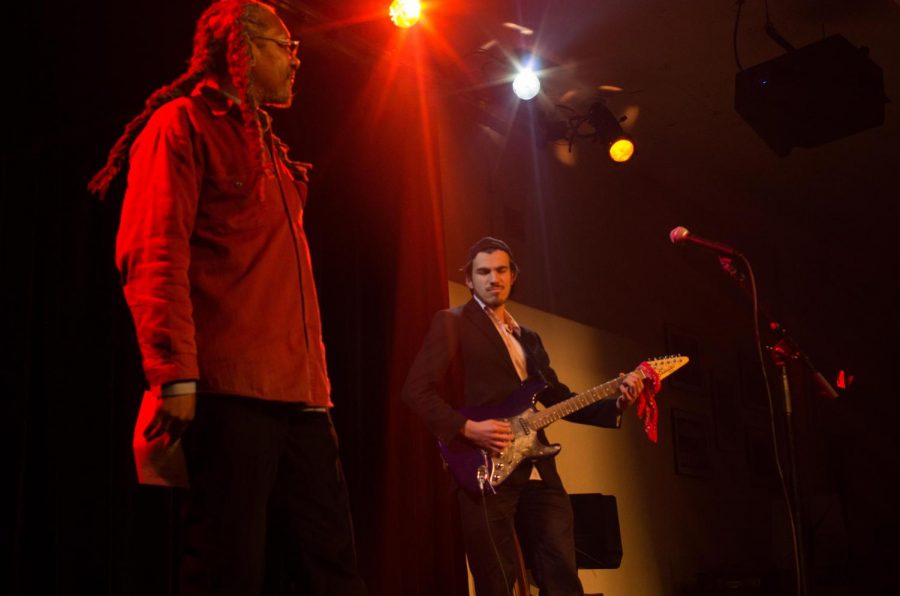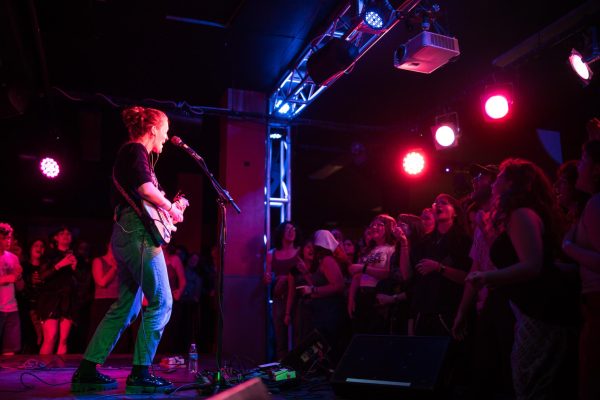“Voices Against Human Trafficking” Combines Education, Performance
Photo by Hugh Newcomb, Photo Editor
Community member Meeko Israel performs two poems during Friday night’s Voices Against Human Trafficking event at the Cat in the Cream, accompanied by Mohit Dubey on guitar.
Editor’s note: This article contains discussion of human trafficking.
Voices Against Human Trafficking, which combined musical and poetry performances with education about human trafficking, drew a large crowd to the Cat in the Cream for its fourth iteration last Friday night. Project Unbound, Oberlin’s anti-human trafficking advocacy group, organized the event and raised $480 in donations for the Human Trafficking Collaborative of Lorain County.
Project Unbound’s work addresses an issue that has a major impact both locally and globally. Worldwide, an estimated 24.9 million people are victims of trafficking, according to a 2017 report from the International Labor Organization and Walk Free Foundation. In Ohio, 191 cases of human trafficking have already been reported as of June this year, and Lorain County is known to be a major transit hub in a national human trafficking route.
“Human trafficking is forced labor — whether it be physical labor or sexual labor,” said College junior Kellianne Doyle, co-chair of Project Unbound. “A lot of people actually think that sex trafficking is more common, but labor trafficking is more common. By labor trafficking, I mean being forced to work with little or no pay, and being exploited by a person or a group of people.”
College senior and fellow co-chair of Project Unbound Sarah Blum explained common misconceptions that many people have about human trafficking, and how the Oberlin community has become more aware in recent years.
“When I [first] came to Oberlin, human trafficking was [seen as] either something that happened far away in [places] like Cambodia or Thailand, or people had no literacy with human trafficking [at all],” she said. “Now, people know about human trafficking. … People know that it happens, and it happens here.”
Last Friday’s Voices Against Human Trafficking featured acappella groups Pitch Please, CHALLaH capella, and the Obertones, as well as a variety of individual singers and poets. According to Blum, who first had the idea for Voices Against Human Trafficking four years ago, incorporating performances into the evening was critical in ensuring that the event drew a crowd.
“I knew I needed to throw a big event, … and I thought of the type of event I would want to go to,” Blum said. “Even if I had no idea what trafficking was, who would I want to be there? And I thought of all the show-stopping groups that we have [on campus], which we have a ton of. … I [thought], ‘Well, what if we combined all the groups that I know have a huge crowd following and bring them together for one event, and … have it be an awareness event as well, [where] we bring the activists and we bring survivors and we bring the knowledge.’ Honestly, the first year … I knew that people weren’t going to come because it was a human trafficking event. They were going to come because OSlam and the Obertones and Pitch Please were there.”
Though the performances are a big draw, the real heart of this year’s Voices Against Human Trafficking was the two survivors from Lorain County who spoke about their experiences.
“This was the first year that we had survivors from Lorain County willing to speak with us,” Blum said. “I think that was probably the most memorable thing for me because from the beginning, I wanted to be able to be a platform for survivors. For the last three years, I wanted Voices to be that. But I didn’t want to ever force any survivor into speaking if they weren’t ready. … Now, we as a community get to embrace two survivors. … I think the love that was present in that space — they got standing ovations — was really empowering for them.”
According to College first-year Carson Dowhan, who performed an original song, the event was very successful in blending performance with education and advocacy.
“I didn’t think the show would hit on such heavy themes,” Dowhan wrote in an email to the Review. “There were moments when silence filled the room, or tears were shed on stage, but that never stopped the audience [from throwing] in snaps in solidarity or [passing] a tissue to [someone] who needed it. When I first heard of the event, I anticipated a few statistics about [human trafficking] and second-hand anecdotes, but nothing as engaging [as] what was shared. … There was a positive atmosphere, everyone was cheering everyone on. But the heavy moments hit hard for me.”
If students or community members would like to learn more about human trafficking or become more involved in supporting local organizations, there are a variety of concrete steps that they can take, as Project Unbound tries to host at least four events about human trafficking every semester.
“[This] parents’ weekend, [Project Unbound is] actually hosting a workshop,” Doyle said. “You can bring your parents and your friends, and that will just be some basic information on human trafficking.”
For Blum, the prevention of human trafficking must go beyond single events, and involve intentionally caring for the people in one’s communities.
“Keep your eyes open,” Blum said. “Even if they’re not a trafficking survivor — which the likelihood is that they’re not — supporting someone on a dark day can prevent this from happening. Human trafficking is … a big climax of a person’s little vulnerable moments. You don’t just end up in human trafficking. You end up in human trafficking because you were vulnerable for [any number of reasons], and then something capitalizes on all of your vulnerabilities. But if one person loved someone through that tiny little vulnerable moment, they wouldn’t have been so tempted by that big, big draw of human trafficking, for whatever motivation. I feel like as a community, we can be supporting people better through the little vulnerable moments, whatever that looks like. Even if they’re not at risk for trafficking, it can’t hurt.”










